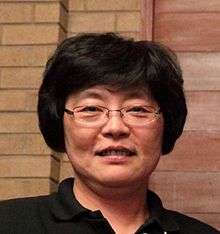Constance J. Chang-Hasnain
Constance J. Chang-Hasnain (born 1 October 1958) is a Taiwanese-born American electrical engineer, and the John R. Whinnery Chair Professor and associate dean for strategic alliances, College of Engineering, the University of California, Berkeley.[1] She is also the current vice president of The Optical Society and will serve as president in 2021.[2]
Constance J. Chang-Hasnain | |
|---|---|
 | |
| Born | 1 October 1960 |
| Alma mater | |
| Known for |
|
| Scientific career | |
| Fields | Electrical Engineering |
| Institutions | |
| Doctoral advisor | John Roy Whinnery |
She obtained a B.S. degree in electrical and computer engineering from University of California, Davis in 1982, an M.S. and a Ph.D. in electrical engineering and computer science from the University of California, Berkeley in 1984 and 1987, respectively. She was a member of technical staff at Bellcore from 1987 to 1992 and assistant professor at Stanford University between 1992 and 1995.
She is a Fellow of the IEEE, The Optical Society, and the Institution of Electrical Engineers, and editor for the IEEE Journal of Lightwave Technologies.[3]
Her research interests include VCSELs, high contrast gratings, and nanostructure growth.[4]
Awards
- 1994 IEEE LEOS Distinguished Lecturer Award
- 2000 Curtis W. McGraw Research Award from the American Society of Engineering Education
- 2003 IEEE William Streifer Scientific Achievement Award
- 2005 Gilbreth Lecturer Award
- 2007 Nick Holonyak Jr. Award, Optical Society of America
- 2009 Guggenheim Fellow[5]
- 2009 Humboldt Research Award, Alexander von Humboldt Stiftung Foundation
- 2008-2013 Vannevar Bush Faculty Fellowship (formerly National Security Science and Engineering Faculty Fellowship)
- 2011 IEEE David Sarnoff Award[6]
- 2015 UNESCO Medal For the Development of Nanoscience and Nanotechnologies
- 2018 Elected Member, National Academy of Engineering[7]
- 2018 Okawa Prize
References
- "Archived copy". Archived from the original on 2013-10-14. Retrieved 2013-10-12.CS1 maint: archived copy as title (link)
- "The Optical Society Elects Constance J. Chang-Hasnain as 2019 Vice President". September 2018. Retrieved 17 September 2019.
- "Constance Chang-Hasnain | EECS at UC Berkeley". Eecs.berkeley.edu. 2012-11-25. Retrieved 2012-11-29.
- "Constance Chang-Hasnain Research Group Website at UC Berkeley". Eecs.berkeley.edu. 2011-03-01. Archived from the original on 2013-10-22. Retrieved 2013-10-11.
- "Constance J. Chang-Hasnain - John Simon Guggenheim Memorial Foundation". Gf.org. Archived from the original on 2012-08-25. Retrieved 2012-11-29.
- "David Sarnoff Award Recipients". IEEE. Retrieved 2012-11-29.
- "Dr. Constance Chang-Hasnain". United States National Academy of Engineering. Retrieved 24 September 2019.
External links
- Constance J. Chang-Hasnain at University of California, Berkeley